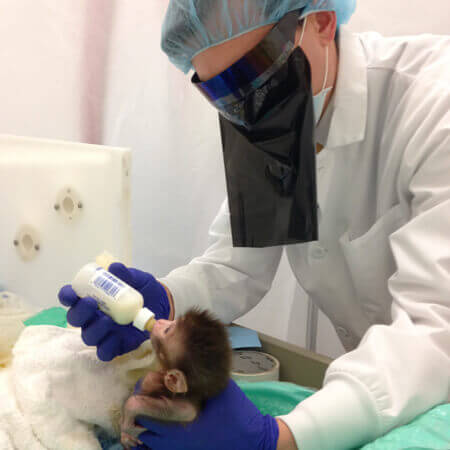
[ad_1]
A degree from Harvard Medical School might not have the sparkle it once did as it continues to face a slew of shocking revelations.
First, PETA exposed the deadly experiments of Harvard’s Margaret Livingstone, who terrorizes baby monkeys in various twisted and pointless tests.

In cruel experiments that have no relevance to human health, baby monkeys in Livingstone’s laboratory are torn away from their mothers and raised in emotionally impoverished conditions, without the possibility of seeing any faces—human or monkey—for a full year.
Then, an indictment was levied against a member of the school’s staff for stealing and selling donated human body parts, including heads, brains, and skins, which was soon followed by a lawsuit alleging that a professor had used his own sperm to secretly impregnate a patient.
As if that weren’t enough, now four Harvard professors are accused of manipulating data in more than 30 published papers, many of which involve experiments on animals.
The National Institutes of Health (NIH) funds these experimenters with your tax money—a combined total of more than $300 million so far.
PETA is urging NIH to yank its funding of these experimenters immediately while it investigates and to revoke it permanently if the allegations are true.
Fresh Allegations of Misconduct
In the latest scandal, an investigation by the research integrity blog For Better Science alleges that four Harvard professors at the Dana-Farber Cancer Institute manipulated data across more than 30 published research papers.
Not only did they allegedly lie about the data from their experiments, they also subjected animals to horrendous suffering and death while carrying them out. Their experiments included injecting animals with toxins, deliberately causing them to grow tumors, irradiating them, and killing and dissecting them.
The Harvard-affiliated Dana-Farber has begun the process of retracting six papers and correcting 31 others. But for the animals tormented and killed for worthless data, the damage is permanent.
Ethical Blindspot on Harvard’s Payroll
These allegations align perfectly with the culture of blunt callousness at Harvard Medical School, where unethical behavior is business as usual inside its laboratories. Harvard’s resident ethically challenged experimenter Margaret Livingstone makes a living tormenting baby monkeys in pointless sensory deprivation tests.
Her experiments include wrenching newborn baby monkeys out of their loving mothers’ arms. She and her underlings have sewn some of the infants’ eyes shut and rear others while wearing welding masks. In both cases, the terrified animals don’t see any faces, human or monkey, for an entire year. After years of abuse, she kills many of them and dissects their brains.
In yet more depraved tests, Livingstone tears baby monkeys away from their mothers and forces them to wear helmets with shuttered goggles that rapidly open and close, creating a strobe-light effect. The infants are compelled to wear the devices for a year and a half, effectively forcing them to live in perpetual and disorienting strobe lighting all day long for 18 months straight.
What You Can Do
If Harvard staff can’t be trusted not to impregnate their unsuspecting patients, traffic in human body parts, or fabricate data, they certainly can’t be trusted to care for the animals locked away in their laboratories.
Please TAKE ACTION by telling Harvard to shut down Livingstone’s laboratory:
Then, please ask NIH’s BRAIN Initiative to cut funding for Livingstone’s latest vile experiments:
And if you’re in the U.S., please take an additional action for animals in Harvard’s laboratories and elsewhere by asking your legislators to support PETA’s Research Modernization Deal, which outlines a comprehensive strategy for replacing all experiments on animals with more effective, human-relevant, non-animal methods:
[ad_2]
Source link

Leave a Reply